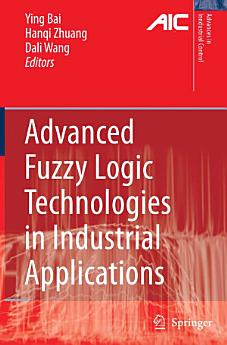Advanced Fuzzy Logic Technologies in Industrial Applications
About this ebook
Advanced Fuzzy Logic Technologies in Industrial Applications addresses the problem by introducing a dynamic, on-line fuzzy inference system. In this system membership functions and control rules are not determined until the system is applied and each output of its lookup table is calculated based on current inputs.
The tuning process is a major focus in this volume because it is the most difficult stage in fuzzy control application. Using new methods such as µ-law technique, histogram equalization and the Bezier-based method, all detailed here, the tuning process can be significantly simplified and control performance improved.
The other great strength of this book lies in the range and contemporaneity of its applications and examples which include: laser tracking and control; robot calibration; image processing and pattern recognition; medical engineering; audio systems; autonomous underwater vehicles and data mining.
Advanced Fuzzy Logic Technologies in Industrial Applications is written to be easily understood by readers not having specialized knowledge of fuzzy logic and intelligent control. Design and application engineers and project managers working in control, as well as researchers and graduate students in the discipline will find much to interest them in this work.
Advances in Industrial Control aims to report and encourage the transfer of technology in control engineering. The rapid development of control technology has an impact on all areas of the control discipline. The series offers an opportunity for researchers to present an extendedexposition of new work in all aspects of industrial control.
About the author
Doctor Ying Bai has been working in the field of fuzzy logic control since 1995. He has published three textbooks and about 20 research papers in international conferences and journals, and most of them are related to the fuzzy logic control on DC/AC motors, laser tracking systems and modeless robots calibrations. He is currently teaching at the Department of Computer Science and Engineering at Johnson C. Smith University.
Dr. Zhuang is an Associate Editor of IEEE Transactions on Robotics and International Journal of Computer Applications. He has received a number of awards and grants, including a NSF Young Investigator Award. He has published one research monograph and 50 refereed journal papers on the subjects of robotics, computer vision and fuzzy logic control. His recent research activities include conducting a project with DOD/DISA on secure telecommunication using fuzzy logic and biometrics.
Dr. Dali Wang is an Assistant Professor at Christopher Newport University. He has over 20 refereed research papers in the areas of digital signal processing, soft computing and robotics. Since 1995, he has been extensively involved in work on the applications of soft computing techniques, including neural networks and fuzzy logic, in many industrial areas: digital signal processing, telecommunications, control and robotics. He gained practical perspective from his five years' industrial experience in the semiconductor, wireless and network communication industry. Much of his research work is involved in combining theoretical aspects and practical implementation.






